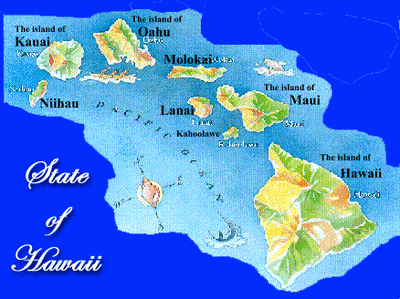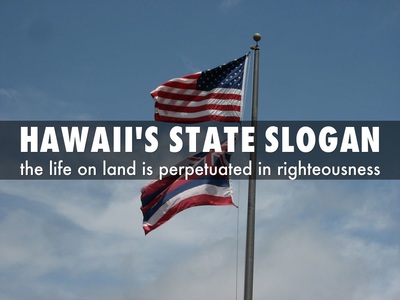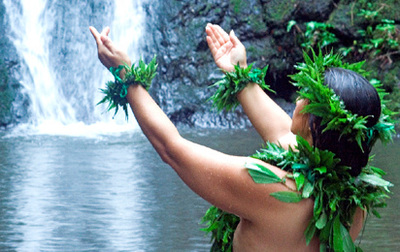|
God’s amazing grace can best be appreciated by recalling His faithful acts of providence throughout history. Hawaii is a special example. When we see God’s handiwork in the lives of our forbearers, can there be any doubt of His aloha for this place and its people? Following are but a few bulleted highlights from Hawaii’s past, demonstrating God’s steadfast love for the Hawaiian people... down through the ages. • The very first peoples to settle in Hawai‘i nearly two thousand years ago, worshipped the One Supreme Creator God whom they called “‘Io” (pronounced: ‘EE-yo’). • ‘Io was also known in Hawai‘i and throughout Polynesia by other names such as: ‘I, ‘Ia, and ‘Iowa; and was cited in ancient chants as: ‘Io-makua-lani, ‘Io-matua-te-kore (Maori), ‘Io-ka-wai-ola; ‘Io-ke-kumu-ola, ‘Ia-o-nalani-nui-a-mamau; depicting various attributes consistent with the Supreme Creator, the God the Hebrews called Yaweh. • The worship of ‘Io was banned in the Thirteenth Century with the invasion of Pa‘ao, who forcibly installed the religious/political “Kapu System” which he brought from Tahiti, and whose stringent practice often included death sentences and human sacrifice. • The Kapu System was a complex collection of laws aimed at maintaining a hierarchal balance among the people and a relational balance with man and the elements. Most of the laws governed crucial activities such as planting and fishing, times and kinds of harvest, etc. • Many of the harsher laws dealt with the preservation of the bloodlines and the sanctity of the ruling chiefs, their gods and their priests. Maiming or death was routinely meted out as sentences for infractions; human sacrifices were made to maintain spiritual balance or favor. • The people of Hawai‘i lived isolated from the rest of Polynesia under this kapu system of absolute control for about 500 years. • The arrival of Captain James Cook in 1778, heralded another paradigm shift in the religious/political system of Hawai‘i. • In 1778, Captain Cook conducted the first Christian ceremony, a funeral service, for one of his crew, upon the grounds of a Hawaiian temple (heiau) at Napo‘opo‘o, Hawai‘i. • In subsequent visits to Hawai‘i, Captain George Vancouver, among others, shared the gospel of Jesus Christ with King Kamehameha the Great and invited the King to receive the faith; to which the King respectfully declined. • At the age of 10, a boy named Opukaha‘ia was orphaned when his family and all the people of his village in Ka’u were killed during the wars of Kamehameha. Two years later, Opukaha‘ia was reclaimed by his uncle, a kahuna (high priest) from Napo’opo’o, and entered into training for the priesthood. At around 16 years of age, Opukaha‘ia gained permission to be released from his training and sailed from Ke’alakekua Bay on an American trading ship. On board, he was given the name, Henry. • Henry O’s travels eventually landed him in Connecticut. There he entered Yale College and became Hawai‘i’s first western-trained scholar and the first Hawaiian Christian. His zeal for Christ and love for the Hawaiian people inspired the American Board of Commissioners of Foreign Missions to organize its first mission team to Hawai‘i. But Henry O died in Connecticut in 1818 with his dream unfulfilled. • A year later, in May, 1819, Kamehameha the Great died. His son, Kamehameha II under encouragement from his mother, Ke’opuolani, the queen-regent, Ka’ahumanu and the high priest Hewahewa, on October 3, 1819, dramatically defied, forsook and dissolved the kapu system as the national religion. • Despite Henry O’s death, the mission that he was to lead to Hawai‘i was organized and launched, leaving Boston in October, 1819 and arriving in April, 1820, in Kailua-Kona, Hawai‘i at the very place where the kapu system had been overthrown exactly six months earlier. • Three young Hawaiian men, William Kanui, Thomas Hopu and John Honoli‘i, friends of Opukaha‘ia, accompanied the mission from Boston, along with George Kaumuali‘i, the son of the King of Kauai. • Upon arrival, the mission learned that Kamehameha the Great had passed nearly a year previous and that the kapu system had been overthrown by the Kamehameha II and others in authority. Hawai‘i was officially in a religious vacuum, and these Christian missionaries were given a probationary period by the new king, to prove the value of their religion. • The missionaries ministered to everyone from the highest royalty to the lowest commoners, serving as doctors, educators, builders, farmers, peacemakers as well as preachers, Bible translators, printers and church planters. • As the result of the selfless work of the Christian missionaries, and a supernatural move of the Holy Spirit, by the 1850s, ninety percent of the Hawaiian people had converted to Christianity and over 90 percent of the Hawaiian people could read and write. • Haili Church in Hilo became the largest church in the world, with a congregation of over 10,000 members. ‘Imiola Church in Waimea, Hawai‘i had a membership of over 4,000. Literally hundreds of churches sprang up all over the islands in what would become known as Hawai‘i’s Great Awakening. • The presence of Christianity caused a positive transformation in Hawai‘i, spiritually, socially, economically, politically, and morally. Christians brought crucial medical care and public health policies to fight pandemic diseases; taught reading, writing, math, science, political science; established written laws and policies for social order; and introduced the principles of democratic governance to the Hawaiian Kingdom. • In 1825 the King and principle leaders declared Hawai‘i a Christian nation. The Preamble to the first (1840) Constitution of the Hawaiian Kingdom states: "… That no law shall be enacted which is at variance with the word of the Lord Jehovah, or at variance with the general spirit of His word. All laws of the Islands shall be in consistency with the general spirit of God’s law.” • The Hawaiian Kingdom motto, "Ua mau ke ea o ka 'aina i ka pono" (The Sovereignty of the Land is Perpetuated in Righteousness), was proclaimed by King Kamehameha III as he gave thanks to God at Kawaiaha'o Church for the return of his kingdom after a brief foreign occupation in 1843. • The fact that Hawai‘i had been become a highly literate, Christian nation, contributed to the formal recognition of the Hawaiian Kingdom and induction into the Family of Nations in 1843. • As a declared Christian nation, Hawai‘i undertook land reform, established a public education system, international trade and participated in progressive political discourse with the principal nations of the world. • In January 1893, without provocation and without warning, the United States landed marines in Honolulu to support a coup d’etat of the Hawaiian Kingdom government by a handful of greedy, powerful white businessmen. The coup was officially supported by the dominant Christian denomination. • Although the United States admitted that it wrongfully participated in the unlawful takeover of the Hawaiian Kingdom in violation of Hawaii’s sovereignty, nevertheless, five years later the U.S. illegally annexed Hawaii. • Because the coup and the annexation were supported by the dominant Christian denomination, its Hawaiian members, loyal to their country, felt offended and betrayed by the church. Approximately 90% of them left the denomination, signifying their distrust of the church, a trend which grew into a distrust of Christianity, particularly the organized Christian church among many Hawaiians today. • Queen Lili‘uokalani was known as a sincere Christian woman who, even through the monumental injustice of the theft of her nation, exemplified grace and dignity. She forgave those who had wronged her and faithfully placed her trust in God to render justice for her people at such a time as this. • Today, although many Christians are engaged in seeking God’s face for the church’s role in bringing about reconciliation of the offense, the church in general stands aloof from the issue. • Although the State of Hawaii under U.S. law is officially a secular state, many of the leaders who have shaped the modern history of Hawai‘i readily acknowledged Christ as their savior and as a guiding force in their daily lives and in the conduct of their professional and personal pursuits. “Ua Mau Ke Ea O Ka Aina I Ka Pono o Iesu Kristo” (The sovereignty of the land is perpetuated in the righteousness of Jesus Christ) Official motto of the Hawaiian Kingdom http://heritagehawaii.org/christianheritage/History.html
0 Comments
Leave a Reply. |
ArticlesHere you will find a wide variety of articles for various authors pertaining to all areas of life. Please click on the category of interest below. Archives
July 2021
Categories
All
|




 RSS Feed
RSS Feed

